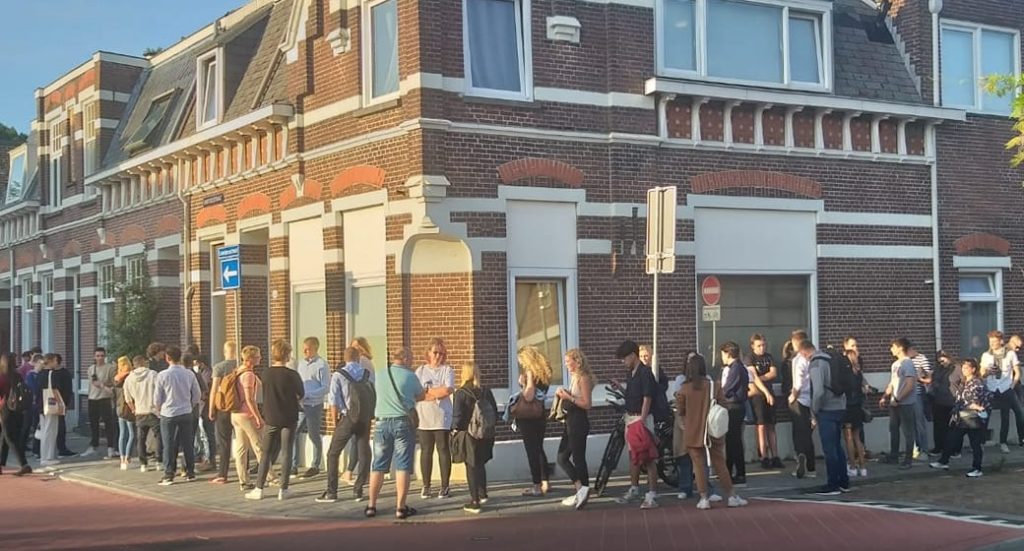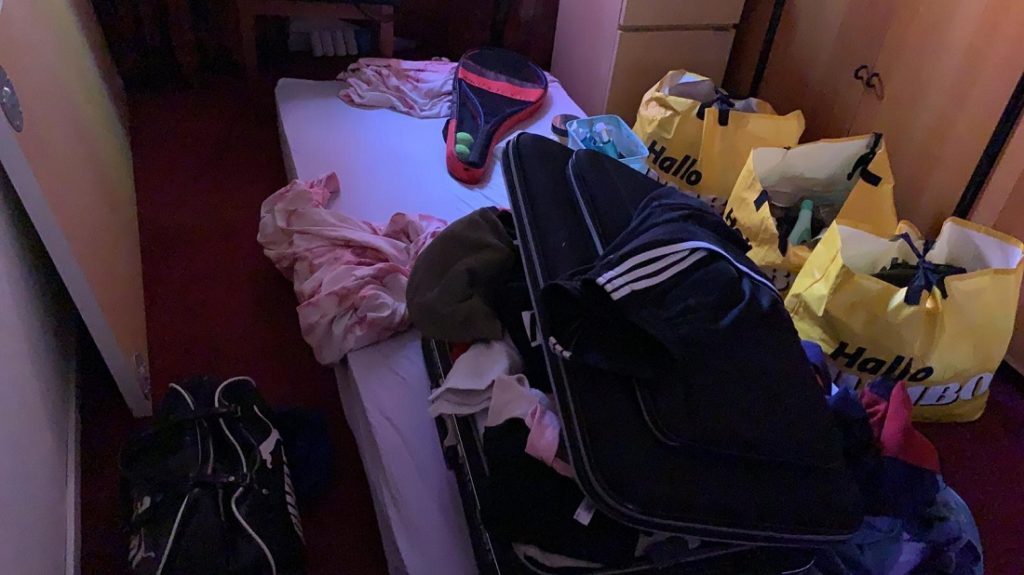Housing crisis 2021: ‘If I had known about this in advance, I would have chosen a different university’
It is a well-known fact that Tilburg has great problems with housing all its incoming students. Those who thought that corona and the resulting wave of digitalization would make this a thing of the past, have been robbed of that illusion in recent months. Now that everyone is flocking to campus again, Tilburg may be facing its worst room shortage ever. And it is the internationals who bear the brunt.

The reopening of the Dutch universities has been accompanied by many positive reactions from the academic world. Finally back to normal, so the thinking goes. Although this joy is completely understandable and justified, the decision also brings a familiar and painful problem back to surface. As the gates have opened again, many hundreds of new students have found their way to Tilburg this summer, making the student housing market even more overheated than it already was.
This year, not only freshmen have been looking for a room in Tilburg, but also second-year students who decided not to come to Tilburg last year because of the pandemic. A large number of them are international students who opted to follow online lectures from their home countries. They are now forced to move to Tilburg as the university offers almost all of its lectures exclusively in physical form again.
All in all, it creates a demand for student rooms that is higher than ever. The biggest victims of this are – as usual – the internationals. While lectures have already started, many of them are still without a permanent roof over their heads. It begs the questions: what is going wrong this year and how can a similar crisis be avoided in the future?
Two hundred and eighty homeless students
In four months’ time she received more than twenty rejections, went to viewings with fifty people or more, paid around a hundred euros in subscription fees for websites like BVwonen and Kamernet, and still has not found a permanent room in Tilburg. That sums it up quite well for Sofia (22), a masters’ student from Barcelona, who is still desperately looking for a new home in Tilburg after she had to leave her old one.
“This summer has been a disaster,” she says. “At the beginning of the year, due to Covid, there was little demand, so I could easily find a room. Now, six months later, the situation has completely changed. I am basically homeless and I do not know until when. Due to this lack of certainty, I cannot focus on completing my master’s degree, which causes me a lot of stress and even begins to affect my personal health.”
‘It seems like some people are taking advantage of our situation’
Sofia
Unfortunately, Sofia’s story is one of many. According to Paulina Snijders, vice-president of the Executive Board of Tilburg University, two hundred and eighty other international students are still searching for permanent housing. “The situation is very worrying this year,” she says.
“Whereas in 2019 we were able to temporarily accommodate a large portion of the internationals in the now demolished Prisma building, this year we have not been able to help them find proper housing. It has led to us having to take the difficult step of communicating to prospective students who had not yet found anything by August, that they had better not come.”
For those who, like Sofia, are already in the middle of their studies and have not yet managed to find something long-term, the university has been able to arrange temporary housing through deals with various hotels, Hostel Roots and safari park Beekse Bergen.
Though Sofia is happy with the stay for now, she does not think it is worth the price. “I pay four hundred euros a month for a storage unit that has no more room than for a matrass and my bags. Plus, there are no windows in it and pillows and a blanket are not included.”
No sense of community
The evident lack of student housing is not the only problem, according to Sofia, it is also the way internationals are treated, she says. “It seems like some people are taking advantage of our situation. Not only are Airbnb and hotel prices skyrocketing, room seekers are also being scammed by fake landlords. In my case, I was even asked three times to send sexually explicit photos in exchange for a room. It’s awful.”
“The worst, however, are the ‘Dutch only’ advertisements in Facebook groups, which explicitly state that only Dutch students are invited to respond to vacant rooms. If I had known about this in advance, I would have chosen a different university. There is just no sense of community. I get it if you don’t want to speak English with me all the time, but at least give me the opportunity to learn Dutch.” ‘The debate around ‘Dutch only’ is a seasonal discussion that recurs every start of the academic year’

Someone who also noticed the trend of excluding international students from student homes is Richard, a Dutch law student who stood up to help room-seeking internationals by bringing them into contact with landlords and other organizations. “Knowing how it feels to be discriminated against in the housing market on the basis of your origin, I felt a great urgency to aid those who are now in the position I was in a few years ago,” he explains.
“The debate around ‘Dutch only’ is a seasonal discussion that recurs every start of the academic year. It’s exhausting. That is why I have made it my own project to get to the bottom of this. I want to find out why students do this to each other, whether it’s potentially criminal, and what impact it has on the excluded internationals.
“Moreover, I want to examine what the socio-economic consequences are for immigrant Dutch people who are also affected by this policy. I feel like I have to do this, because if I don’t, no one will, and the problem is going to be back next year.”
International students can also count on moral support from the university, which takes a firm stance against the discriminatory policies governing the student housing market. Snijders: “We find it important for our students to have an open mind. To leave your fellow students out in the cold like this is therefore completely unacceptable to us. Change, however, must come from within the student community. Talk to each other about it.”
Covenant
A common sentiment among the internationals is that the university should take its responsibility in this housing crisis; after all, its drive to expand is the main cause of Tilburg now being overrun by (international) students, creating more demand than the city can handle.
“As a university, we certainly feel responsible for housing our internationals,” Snijders says. “Yet the instruments we have at our disposal are very limited. We are not allowed to build or offer housing ourselves, so we are dependent on other parties who do have that possibility. With them we are in constant conversation.”
Last year, a covenant was drawn up between, among others, the Tilburg Municipality, housing corporations and Tilburg University, in which they agreed to create 1,900 housing units for students in the period between 2020 and 2024. At the time of signing, 1,300 of these had already been realized or were in preparation, leaving another 600 to be built.
‘As a university we certainly feel responsible for housing our internationals’
Paulina Snijders, vice-president of the Executive Board of Tilburg University
Even though these plans sound promising, it is a slow process that does not benefit the current room-seeking students. Moreover, students complain that the prices of already completed student complexes, such as The Cobbencampus, The Rumour and, most recently, The Garden, are too high. Instead of living in luxurious apartments, they prefer to live together in affordable student houses.
Snijders: “The university is pushing for such affordable housing. But as I said, our hands are tied when it comes to providing it, since the municipality has decided until recently to leave student housing to private parties. And what makes it even more awkward is that precisely these sought-after, cheap student rooms are located in ‘Dutch only’ houses.”
Elephant in the room
As long as the scarcity of student housing persists, temporary ideas will have to provide a response. That is why last week, Rector Magnificus Wim van de Donk called on the residents of Tilburg to take a student into their home, hoping it will take some pressure off the housing crisis.
Another option could be to continue to offer online lectures and exams for those who have not been able to find a permanent room yet and therefore had to return home. Due to covid, we know this is a feasible possibility. “All non-first-year students are currently provided with temporary accommodation so there is no reason for them to return,” Snijders responds. “Besides, there are some things we cannot stream, such as exams. However, whenever online is possible, we will do so.”
In the end, these are no durable alternatives and just ways to circumvent the fundamental problem, which is the big gap between the amount of available student rooms and students looking for a room. And that gap only seems to get bigger. It is expected that in the academic year 2024-2025 at least 50,000 students in the Netherlands will be without permanent living space, which is double what it is now.
Perhaps, therefore, it is time to address the elephant in the room: should the university stop pursuing growth and possibly even lower the number of places within its programs? Continuing to admit students when you know you have little grip on the supply of housing does indeed not seem like the most responsible course of action.
According to Snijders, the university is in fact already doing this by warning prospective students about the housing situation and telling those who have not found a room, not to come to Tilburg. Sofia, however, does not understand this. “If it is such a structural problem, could you really not have thought about that before you admitted them and created false expectations?”
The name ‘Sofia’ is fictitious. Her real name is known to the editorial staff.






